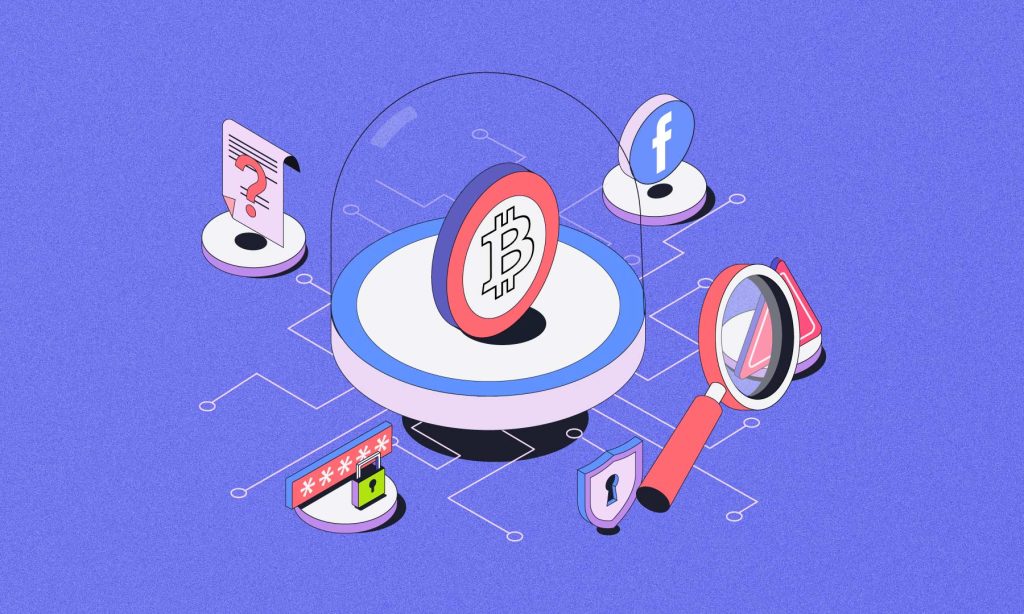Crypto assets have taken the financial services sector by storm. Powered by blockchain technology, the decentralized system has democratized investments and empowered millions worldwide. But despite the enablement, crypto scams have spooked millions, raising questions about the safety of crypto transactions. This blog post will discuss the topic in detail, with tips to avoid scams.
How does crypto work?
Crypto assets can be sold, purchased, or transacted through the use of blockchain technology, a decentralized ledger that records and verifies transactions on a network of computers. When a user sends a crypto asset to another user, the transaction is recorded on the blockchain and verified by a network of computers known as nodes. The nodes use complex algorithms to validate the transaction and ensure that the sender has sufficient funds to complete the transaction. Once a transaction is validated, it is recorded on the blockchain and becomes a permanent part of the ledger. This provides a transparent and secure way to track and verify crypto transactions.
Cryptos are stored atop the blockchain network, and the private keys to access these digital assets are through a digital wallet. Users can send and receive crypto assets through their wallets and track their balance and transaction history. Since there is a fixed and often limited supply, digital assets are scarce. This holds especially true for Bitcoin, which is a major reason for its extremely high price.
Tips to avoid crypto scams
Consumers in the United States reportedly lost over $80 million in crypto scams in the six months leading to March 2021, according to a report by the Federal Trade Commission (FTC). The figure represents only the reported losses, and the number is likely much higher. Scammers use various tactics, such as fake exchanges, fraudulent ICOs, phishing scams, and Ponzi schemes, to trick users into sending them crypto or providing access to their wallets. The easy way to avoid falling prey to such schemes is to maintain adequate security and consistently keep yourself aware of the risks. Here are some common sense tips that will keep you safe in crypto markets.
Never share your wallet’s seed phrase
The seed phrase stored on your physical or digital wallet is a series of words that allow access to your crypto wallet. Never share it with anyone, as scammers can use it to steal your funds.
Do your research
Before investing in any crypto, do your research to verify its legitimacy and value. Look for information on the project’s team, whitepaper, and community.
Ignore urgent requests
Scammers often create a sense of urgency to pressure users into making quick decisions. Ignore any urgent requests and take the time to verify the legitimacy of the request.
Be suspicious of social media posts
Social media is a common platform used by crypto scammers. Be wary of posts that offer free crypto assets such as Bitcoins or Ethereum or promise unbelievable returns on investment.
Ignore random DMs
Scammers may reach out to you through direct messages on social media or other platforms. Ignore any messages from strangers, and do not engage in any conversations about cryptos.
Make sure the website address is correct
Scammers may create fake websites that look similar to legitimate crypto exchanges or wallets. Always double-check the website address before entering any personal information.
Download apps from official mobile app distribution platforms
Only download crypto-related apps from official app stores, such as the App Store or Google Play.
Avoid anything with “promises” or “guarantees”
Be wary of any investment opportunities that promise high returns or guarantees. The crypto market is highly volatile and unpredictable, and there is no such thing as a sure-shot return on your investment.
Conclusion
As with any investment, it is important to do your research and be wary of any offers that seem too good to be true. Never share your private keys or seed phrases, and only invest what you can afford to lose. By taking precautions and being vigilant, you can protect yourself from crypto scams.
FAQs:
How can you avoid crypto scams?
To avoid crypto scams, it’s essential to do your research, invest in established projects with a solid track record, and only use trusted exchanges or wallets. Avoid unsolicited offers or those with guarantees of high returns, and always double-check the legitimacy of a project or exchange before investing. Never share your private keys or seed phrases; use two-factor authentication on all accounts. Be wary of phishing scams and fake websites or apps, and always keep your antivirus and security software current.
How to identify fake crypto?
Fake cryptos may be challenging to identify, as scammers can create convincing websites, whitepapers, and social media accounts to promote their scams. However, some red flags include promises of guaranteed returns, lack of transparency or verifiable information about the project or team, and unsolicited offers. Always research a project thoroughly before investing, and look for independent verification of its legitimacy.
How do you ensure the safety of crypto?
To ensure the safety of your cryptos:
– Use trusted wallets or exchanges with a strong track record of security
– Use two-factor authentication on all accounts, and never share your private keys or seed phrases with anyone.
– Keep your antivirus and security software up to date, and be cautious of phishing scams or unsolicited offers.
– Use hardware wallets for added security, and always double-check the accuracy of wallet addresses before sending cryptos.
What can I do about the crypto scam?
If you’ve fallen victim to a scam, seek legal advice. If you’ve provided access to your wallet or private keys, transfer your crypto to a new wallet immediately. Stay vigilant for signs of further fraudulent activity, and use two-factor authentication and strong passwords on all accounts. Finally, educate others about the risks of such scams and the importance of due diligence and caution when investing.








